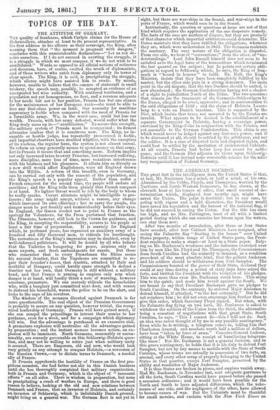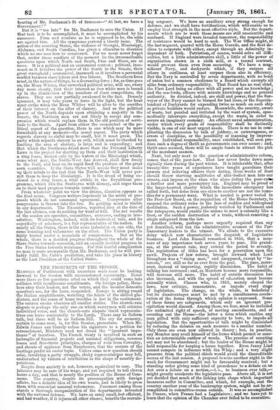THE AMERICAN BOURBON.
Tire great fact in the intelligence from the United States is that, at last, Mr. Buchanan has a mind, or half a mind, of his own. Abandoned by the Cobbs, Floyds, and Thompsons, worried by the Northern and North-Western Democrats, he has shown, at the eleventh hour of his tenure of office, that small amount of de- termination which, displayed four months ago, might have saved the Union. The point is doubtful ; but in any case, by acting with vigour and a bold discretion, the President would
have saved his reputation and the honour of the national flag, if he did not succeed in saving the Union. But the tide has risen too high, and no Mrs. Partington, least of all with a limited period during which she can exercise her broom upon the waters, can stay them now. After two months of irresolution, after three or four States have seceded, after four Cabinet Vinisters have resigned, after seeing the Palmetto flag "floating to the breeze" over United States property, within range of United States guns, the Presi- dent resolves to make a stand—at least in a State paper. Rely- ing on Mr. Buchanan's weakness and the influence exercised over him by men like Mr. Floyd and Mr. Thompson, the Commissioners from South Carolina had the audacity to demand, as a condition precedent of the most absolute kind, that the gallant Anderson and his soldiers should be withdrawn from Fort Sumpter. The Commissioners boasted of the power of their State, declared they could at any time during a period of sixty days have seized the forts, and twitted the President with the violation of his pledges. This was more than even Mr. Buchanan could bear. This stung him to the quick, and made him revolt against the South. We are bound to say that President Buchanan gave no pledges to South Carolina. On the contrary, he ordered Major Anderson to defend himself, if attacked, " to the last extremity." But he did not reinforce him; did not even encourage him further than to give this order, which Secretary Floyd signed. But when, with the Palmetto flag flyina.° on two forts, Mr. Buchanan is asked to withdraw the soldiers of the Union from the third, the alternative being a cessation of negotiations with that great State, South Carolina, he says, " This I cannot do—this I will not do. Such an idea was never thought of by me in any possible contingency." Even while he is writing, a telegram comes in, telling him that Charleston Arsenal, and muskets worth half a million of dollars, have been "taken by force of arms." Conceive General Jackson, sitting at the White House, in receipt of humiliating telegrams like these ! But Mr. Buchanan is not a general Jackson, and in this grave contingency, he holds that it is his duty to defend Fort Sumpter, but not by any means to meddle with the State of South Carolina, whose troops are actually in possession of two forts, an arsenal, and every other scrap of property belonging to the United States in that quarter, except Fort Sumpter, preserved by the ability and resolution Of Major Anderson.
It is thus States are broken in pieces, and empires vanish away. Had Mr. Buchanan, in November last, sent adequate garrisons to all the forts, South Carolina would have paused before she passed a secession ordinance ; and it would have been possible for the North and South to have adjusted differences, which the vehe- mence of one side, and the negligence of the other, have allowed to become causes of war. But the Unionists must be thankful for small mercies, and exclaim with the New York Times on hearing of Mr. Buchanan's fit of firmness—" At last, we have a Government ! "
But it is "too late" for Mr. Buchanan to save the Union. If that task is to be accomplished, it must be accomplished by his successor. Firm and resolute as he is supposed to be, the odds are against him. All the symptoms portend a bloody issue. The action of the seceding States, the violence of Georgia, Mississippi, Alabama, and South Carolina, has given a stimulus to disunion which no one sees how to counteract. For we must never forget
that, under these conflicts of the moment lie the irreconcileable questions upon which North and South, Free and Slave, are at issue. It is a political and an economical contest ; political, inas- much as it involves the power of the South in the Senate, their great stronghold ; economical, inasmuch as it involves a perennial conflict between slave labour and free labour. The Southern force must, in the nature of things, be a decreasing force ; for, as time goes on, the Mean Whites, that unworked political mine, will see, every day more clearly, that their interest as free white men is bound up in the diminution of the numbers of their competitors, the slaves. They are now partially awakened to the fact. Densely ignorant, it may take years to force in the light, but the hour must strike when the Mean Whites will be alive to the sacrifice of their interest on the altar of slavery. And as the political power of the North depends upon obtaining a majority in the Senate, the Northern men are not likely to accept any com- promise which would replace them in the old position of servi- tude to the South. Apart from either the economical or the po- litical aspect of the question, there is one which may be more formidable at any moment—the moral aspect. The party which regards slavery as sinful may be small, but it must grow. The party which regards slavery as an evil, which must be checked by limiting the area of slavery, is large and is expanding ; and that which the Southerns dread more than the Personal Liberty Laws is the project for shutting up them and their institution in a ring fence, broken only by the waters of the Mississippi which, come what may, the North-West has decreed, shall flow freely to the Gulf, and bear on its rapid flood the produce of the great corn countries. If the Slave States will secede they must make up their minds to the fact that the North-West will never per- mit them to keep the Mississippi. It is the dread of being en- closed in a ring fence, a vital article in the Republican pro- gramme, which fills the Southerns with dismay, and urges them on in their mad progress towards anarchy. From whatever point we view the drama, disunion appears as the final scene. Congress welters hopelessly in the midst of pro- posals which do not command agreement. Compromise after compromise is thrown into the fire. No guiding mind is visible in any department. The Executive, reported firm at the date of the last advices, can do nothing for want of will. The net results of the session are speeches, committees, caucuses, ending in irre- solution. Washington, indeed, with its hubbub of talk, and its superfluity of schemers, is a fair representative of the nation. In nearly all the States, there is the same indecision on one side, the same boasting and vehemence on the other. The Union party is fairly buried under a mountain of compromises. But on the whole, there is a decided progress throughout the whole of the Slave States towards secession, and an equally decided progress in the Free States towards resistance. For this fearful complication no man is more answerable than Mr. Buchanan, and he will pro- bably fulfil Mr. Cobb's prediction, and take his place in history as the Last President of the United States.



























 Previous page
Previous page